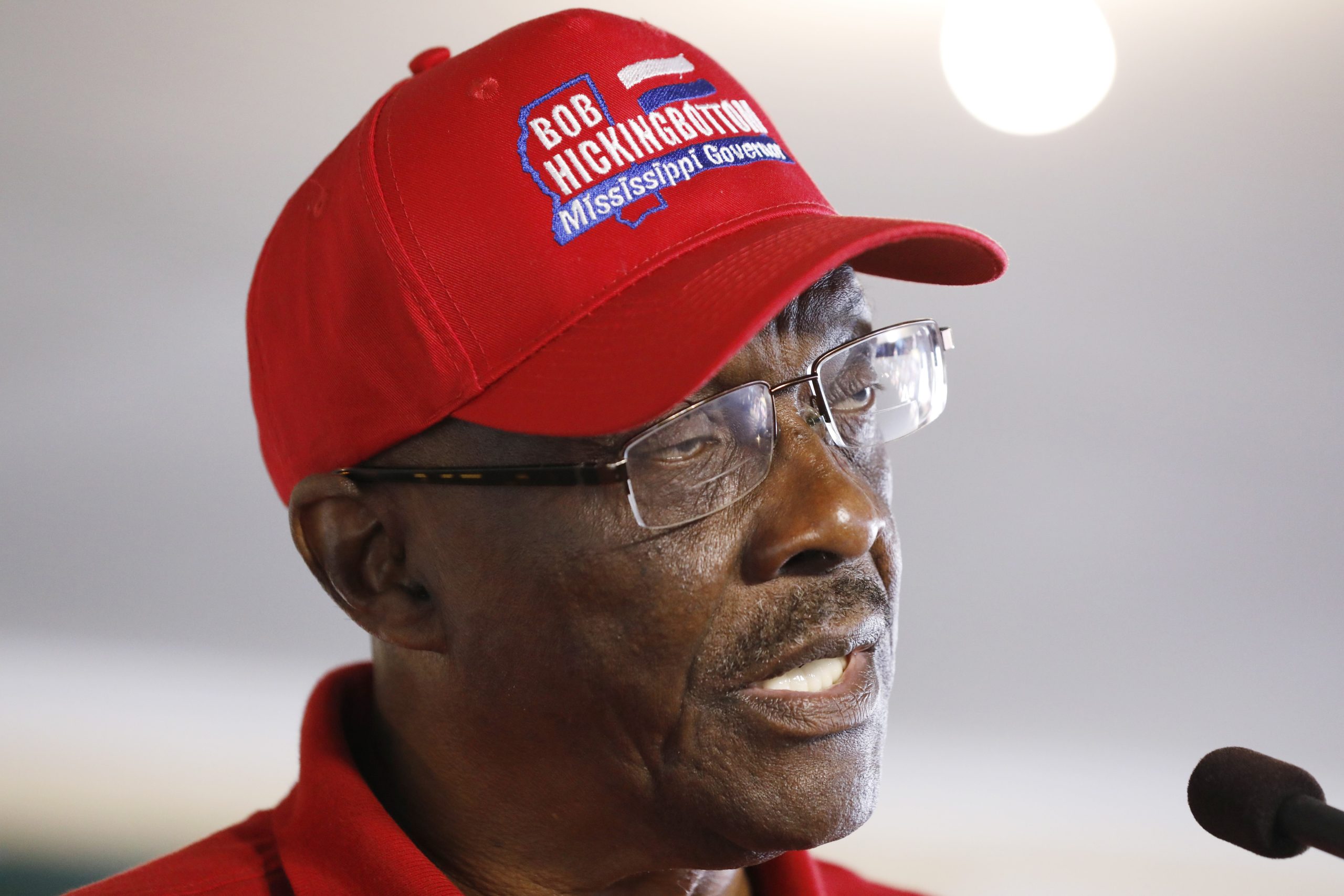Mississippi Today
What is Bob Hickingbottom up to?
What is Bob Hickingbottom up to?
Bob Hickingbottom, a little-known Democrat running for governor in 2023, posted a soon-to-be viral message to his campaign Facebook page on Feb. 17 around 3 p.m.
“… I hope you will join me and vote for the Democrats from the top to the bottom of the ticket. With the exception of my good friend Lt. Gov. Delbert Hosemann who has to run as a Republican to win. Delbert is really a Democrat and has been our friend through the years. We all need to do everything we can for him,” Hickingbottom wrote to his 400 or so page followers.
A few minutes later, at 3:34 p.m., Hosemann’s GOP opponent in the August primary for lieutenant governor, state Sen. Chris McDaniel, posted a screenshot of that Hickingbottom post onto his own page with the post: “There you have it. Democrats Love Delbert! #DelbertTheDemocrat.”
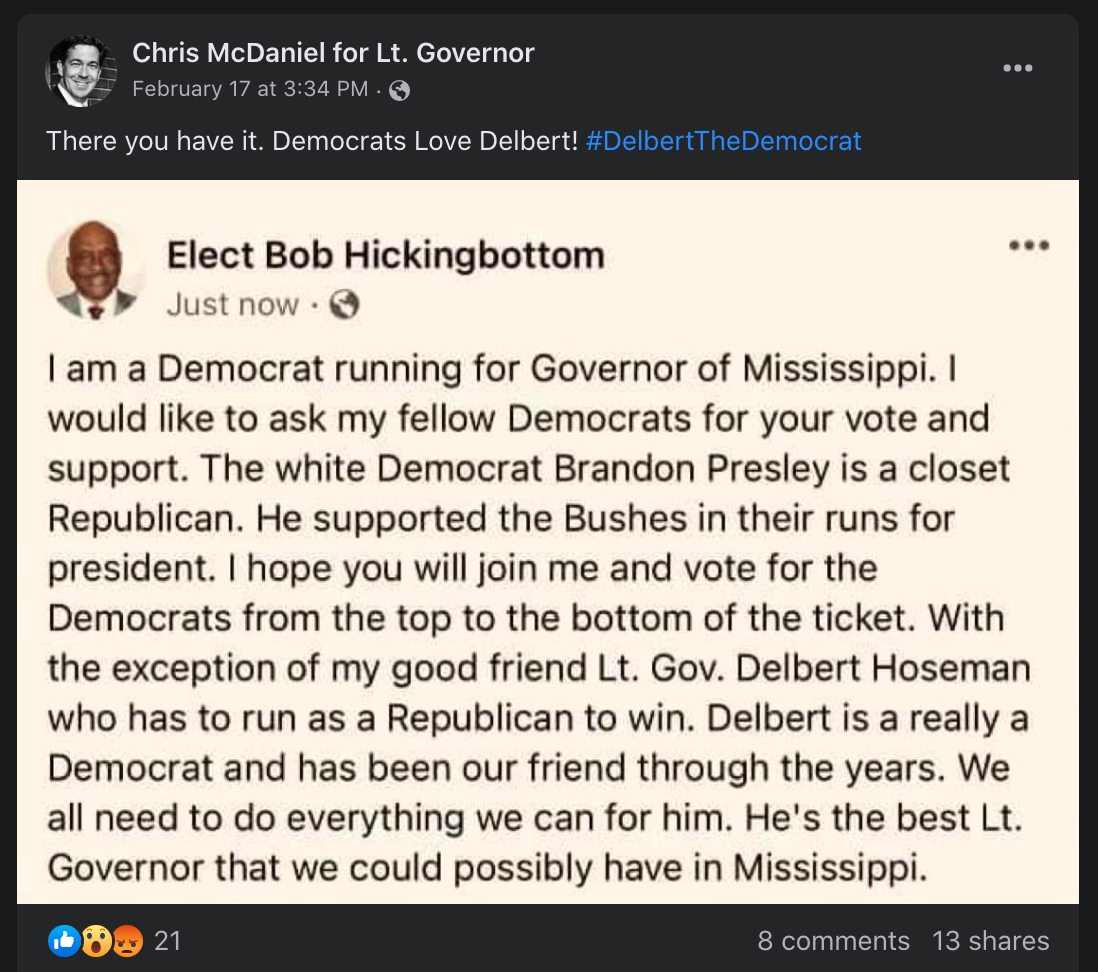
McDaniel is the far-right conservative who developed a national brand and following in 2014 when he nearly defeated longtime U.S. Sen. Thad Cochran. In that 2014 race, McDaniel ran what is considered the first Mississippi campaign to realize the full political power of social media. He has since sharpened that skillset and has hundreds of thousands of followers of like-minded, fired-up conservatives across the state and nation.
After McDaniel posted the Hickingbottom screenshot, his social media machine got to work. Several right-leaning and pro-McDaniel Facebook groups and users begin reposting it with the hashtag #DelbertTheDemocrat. Many of these other accounts have ridden McDaniel’s coattails in the development of their own brands and social media followings.
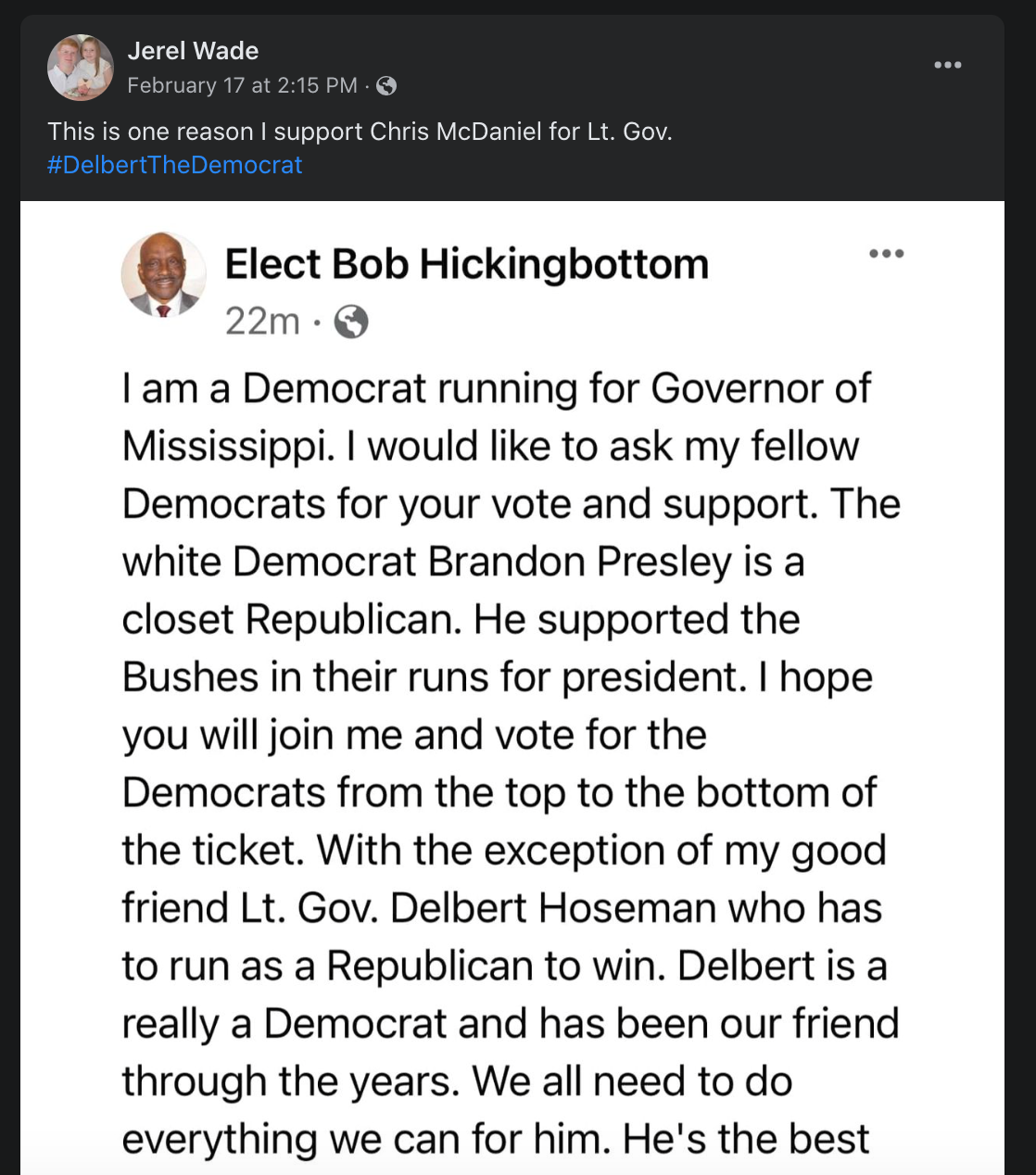
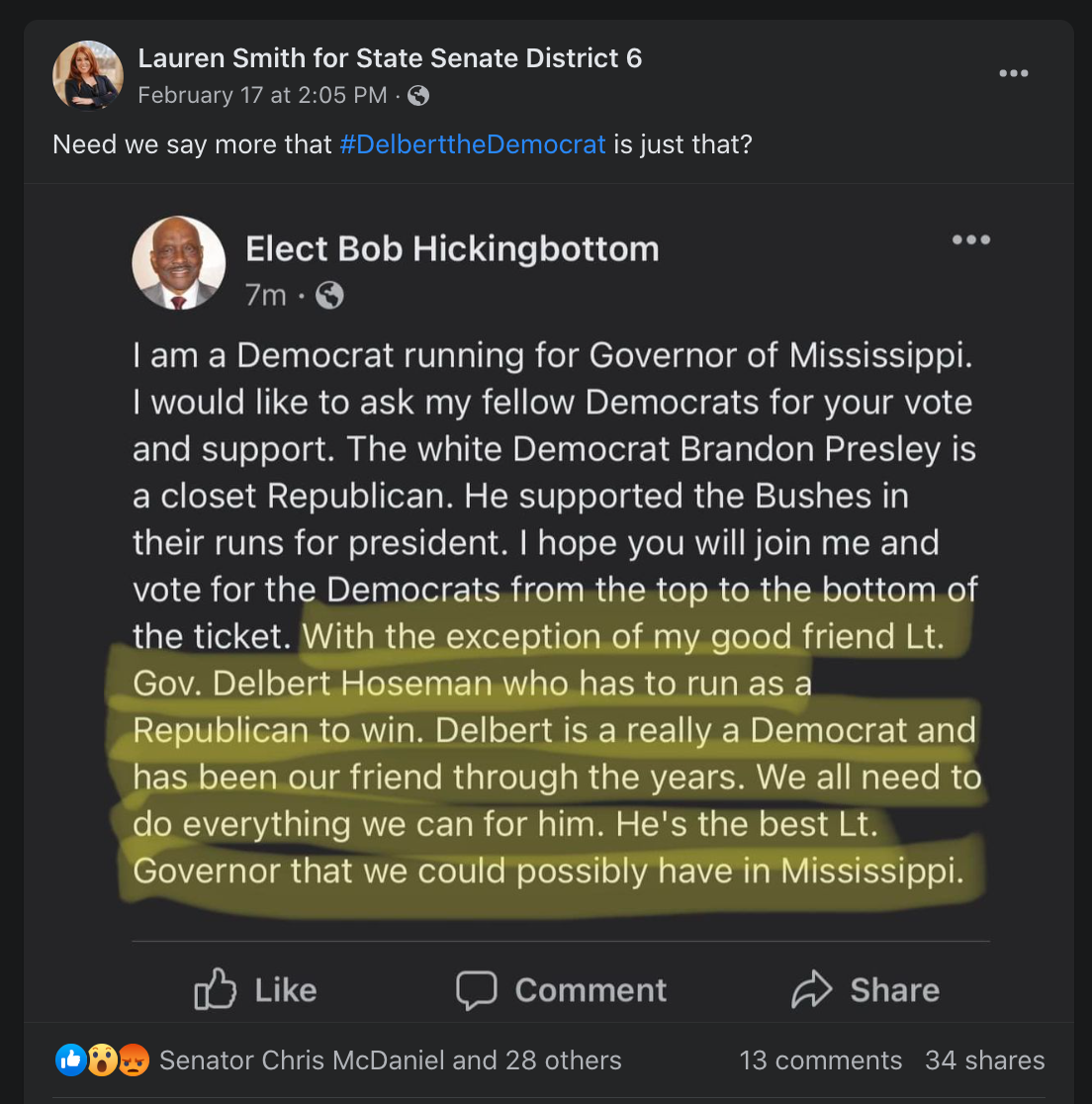
That evening, though, several Facebook users posted a different version of the Hickingbottom screenshot that spread quickly through Mississippi’s far-right conservative online spaces. This separate version of the Hickingbottom screenshot clearly showed something peculiar under the post: “Posted by Ashley Rae Bright.”
Social media savants know that those words being listed there indicates that a woman named Ashley Rae Bright is the “Elect Bob Hickingbottom” Facebook page administrator. In political campaigns, Facebook administrator duties are typically reserved for staffers of a campaign. It’s a delicate and important power to wield, and campaigns, in particular, are very careful about who gets granted that access.
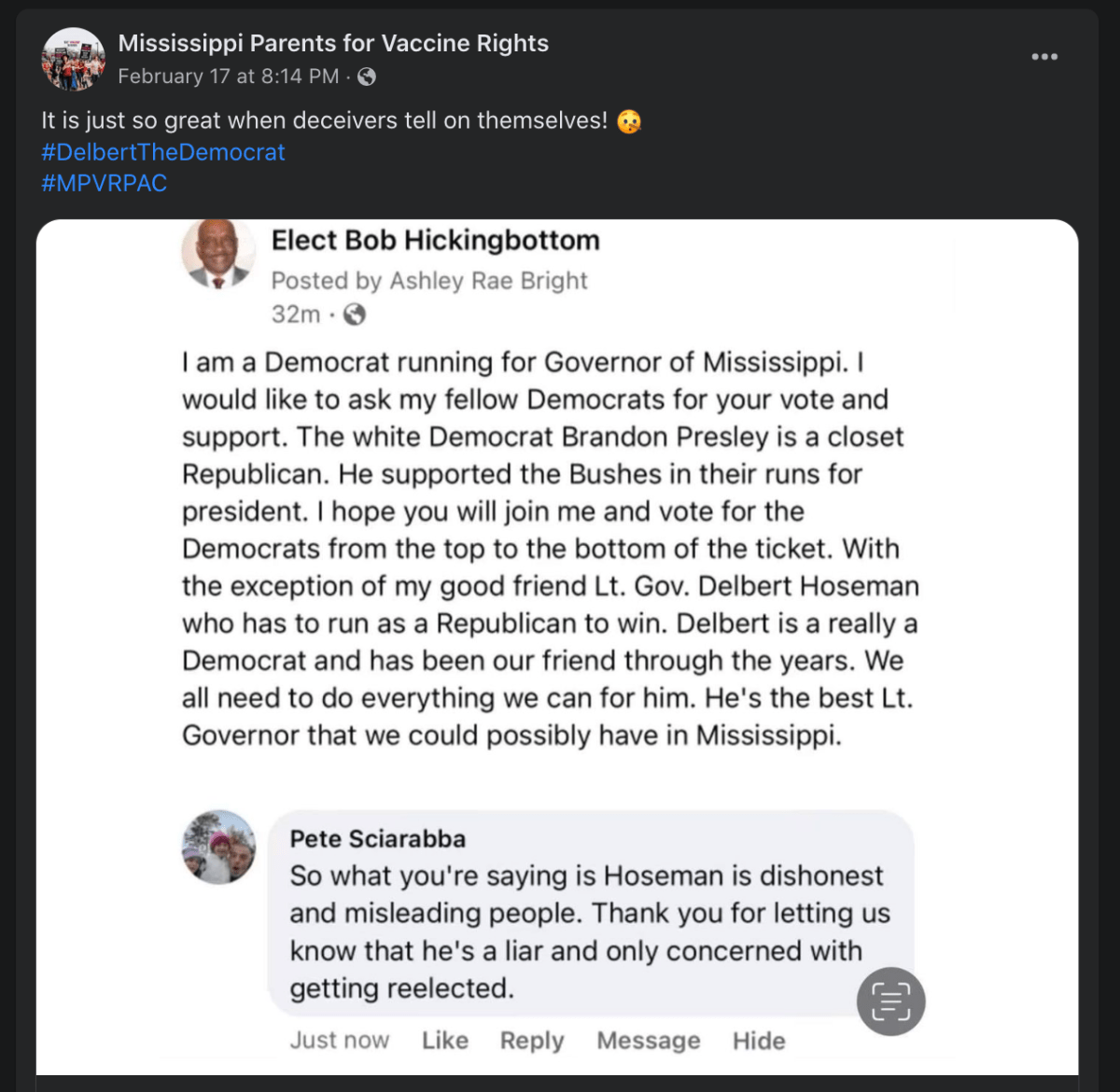

A quick Google search of Ashley Rae Bright shows that she is a consultant for The Allain Group, a Jackson-based political consulting company “offering strong strategic and creative expertise to political campaigns and business clients.”
The president of The Allain Group is Lane “L.C.” Murray, a longtime Mississippi political operative. Murray, a self-admitted former member of the Ku Klux Klan, became a controversial player in the 2014 Senate race between McDaniel and Cochran.
Murray told Breitbart News during the 2014 race that he was a McDaniel supporter after Murray threatened a Republican state senator by phone. His former membership to the KKK was a focus of the Breitbart piece.
Mississippi Today contacted Murray last week to ask if The Allain Group was working for Hickingbottom’s campaign in any way.
“The Allain Group hasn’t been hired by him,” Murray told Mississippi Today in a phone interview. “I do know Mr. Hickingbottom, he’s a better friend than anything else. I haven’t talked to him in a while. I know he’s had COVID and he recently got kicked off the Democratic ballot. But no, Hickingbottom has not contacted The Allain Group, and we are not doing anything for him.”
Asked why Bright, an employee of The Allain Group, appeared to be an administrator of the Elect Bob Hickingbottom Facebook page, Murray deflected.
“I don’t know anything about that,” Murray said. “She works some part time for us, uh, back and forth. I remember her saying something about her computer being hacked or something like that. She was raising hell one day about her Facebook had been hacked. But I’m going to talk to her in the next hour or so, and I’ll call you back and tell you what I find out.”
Murray hung up and called back later that day with an update.
“She does not know Bob Hickingbottom,” Murray said of Bright. “She said somebody hacked her computer, something about someone posting something to his campaign page. She reported it. A day or two later somebody hacked it with something else. I don’t know too much about computers. But like I said, I do know him, but we’re not doing any work for him at all.”
Mississippi Today reached out to Bright directly on Facebook and asked if she was working for the Hickingbottom campaign.
“Sir, I do not know the gentleman,” Bright wrote in a message. “My Facebook was hacked a couple times several weeks ago.”
When Mississippi Today sent Bright a screenshot that showed her as the Elect Bob Hickingbottom Facebook page administrator, Bright replied: “I seen that post as well, changed password and all. I don’t know him so therefore I can’t help you.”
When Mississippi Today then asked why a hacker would make her an administrator of Hickingbottom campaign’s Facebook page to post a political message, she doubled down on her denial of any work with Hickingbottom.
“Sir, I told you I do not know the gentleman,” Bright replied. “I do not know how that showed up on my Facebook. I’ve answered your questions. Now please leave me alone!”
Bright and Hickingbottom are friends on Facebook. Mississippi Today did not get the chance to ask Bright about why she is Facebook friends with someone she purportedly does not know before she declined to speak further.
Hickingbottom, 75, has been involved in Mississippi politics for decades. He broke through working as a political operative for scandal-ridden former Jackson Mayor Frank Melton. Speaking on popular conservative radio host Kim Wade’s show in 2007, Hickingbottom put his career this way: “I’ve been at the forefront of every dirty deal that was cut in politics.”
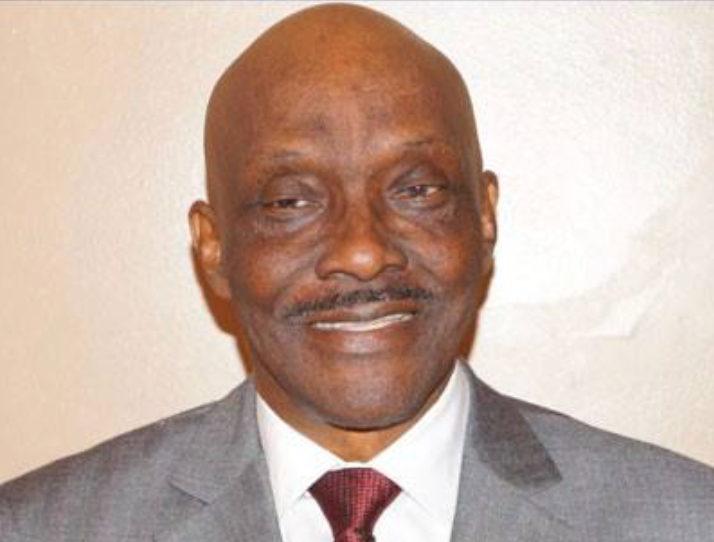
In 2019, Hickingbottom ran for governor as a Constitution Party candidate, using his limited platform to blister Democratic nominee Jim Hood, who came within six points of defeating now-Gov. Tate Reeves. In public Facebook posts during that race, Hickingbottom rarely turned his ire toward Reeves.
And most recently, Hickingbottom has been the subject of broad statewide news coverage after he and another candidate for governor were disqualified from the 2023 Democratic ballot. State Democratic Party officials say he was disqualified for not filing a statement of economic interest, a required form where candidates publicly disclose their personal business interests, and required campaign finance reports when he ran for governor in 2019. Since his disqualification, Hickingbottom has publicly panned Democratic Party leadership and has even threatened a lawsuit.
In a Mississippi Today interview with Hickingbottom last week, he said he thought it was “unconscionable” that the Democratic Party would disqualify two Black men in a primary against Public Service Commissioner Brandon Presley, who is white and widely regarded as the party’s frontrunner.
But later in the interview, talking about his political background, Hickingbottom said: “I’m pretty conservative myself, to tell you the truth. I’m honestly too conservative for the Democrats probably.”
“I’ll put it to you this way, I’m a political operative,” Hickingbottom said. “I’ll work with whoever hires me, Democrat or Republican or whoever.”
Mississippi Today asked Hickingbottom in the interview about the controversial Facebook post about Hosemann and the apparent ties to The Allain Group.
Hickingbottom told Mississippi Today that he published the Facebook post himself. Asked why Bright was listed as his Facebook page administrator who posted it, he got weird.
“I don’t, well, I don’t know an Ashley Bright. I don’t know who she is” Hickingbottom said before abruptly changing the subject.
When Mississippi Today circled back about why Bright showed up as the administrator of his campaign Facebook page, Hickingbottom paused.
“I’ll be honest with you, I’m an old guy and I didn’t even know anything about computers,” he said. “… I know how to do email and put stuff on Facebook, and I learned that basically through my telephone. All I can tell you is I don’t know her, I’ve never met her. Maybe she got hacked. All I use Facebook on is my phone. My phone has been hacked many times. I’ve had a reputation — let’s just put it like this, I was a flamethrower … I have a lot of enemies.”
He said several times during the interview that he believes Hosemann, a successful politician who has won four statewide elections as a Republican, is a Democrat. Hickingbottom said that he did not intend to hurt Hosemann nor help McDaniel.
“In 2014, I was on the air with other people talking against Chris McDaniel,” Hickingbottom said. “He was Tea Party, trying to do Thad (Cochran) in. We were talking about him real bad. A lot of people asked us to rip Chris McDaniel and get people to vote for Thad Cochran.”
Asked if he’d in any way solicited the help of The Allain Group to work on his campaign, Hickingbottom said he hadn’t. But he did acknowledge he knew Murray, the president of the consulting firm.
“I’ve known Lane Murray, he’s a fixture in politics,” Hickingbottom said. “I’ve been an operative myself for years and years. I know Lane Murray, Greg Brand, and to some extent they know me. But I haven’t seen him in two or three years at least. Since probably the end of 2020. I know him, but that’s the extent of it.”
Greg Brand, whom Hickingbottom mentioned unprompted, is another Mississippi political operative with a troubled past.
In 2016, then-Secretary of State Hosemann pushed then-Attorney General Jim Hood to pursue charges against Brand for violating election law — specifically for mailing attack ads without identifying the group or individual who sent it. Brand and another operative were sentenced to six months probation and a $500 fine. Brand briefly tried to sue Hosemann in federal court over the episode, but that lawsuit was dismissed.
There’s yet another strange tie between Hickingbottom and The Allain Group: they are immediate neighbors in the same Jackson office building, according to Mississippi Secretary of State records.
Hickingbottom, who owns a company called “Blackstone Distributors LLC,” lists his business address at 1755 Lelia Drive, Suite 232, Jackson, MS 39216. The office for The Allain Group is 1755 Lelia Drive, Suite 222, Jackson, MS 39216. The suites are directly next to one another on the second floor of the office building.
Hickingbottom told Mississippi Today he had a small office space at that address “a couple years ago, but I was wasting money by paying for it so I moved out.”
Murray repeated something similar.
“I’ve been in that office for four or five years,” Murray said of the office. “He had an office close to mine, a little one room thing. I might have seen him once or twice, but I don’t think he’s been in there for two or three years.”
Both Murray and Hickingbottom denied any coordinated effort to help McDaniel’s campaign.
Meanwhile, Hickingbottom continues posting incendiary Facebook posts about Hosemann. And McDaniel and his far-right social media circles keep using Hickingbottom’s posts to campaign directly against Hosemann. The strategy appears thorough and coordinated, and it has continued for weeks.
Radio host Kim Wade, a longtime and active public supporter of McDaniel, again had Hickingbottom on his show on Feb. 21 — just four days after Hickingbottom’s controversial Facebook post.
When Hickingbottom reiterated on the show that Hosemann was a Democrat, Wade replied: “Wow. There is some validity to what you’re saying given how he treated President Trump and how he treats conservatives. We can ignore it at our own peril.”
A clip of that radio show made its rounds on McDaniel’s social media.
“A MUST LISTEN,” McDaniel’s 2014 campaign manager and current state Sen. Melanie Sojourner posted to her Facebook page with a clip to the Wade interview.
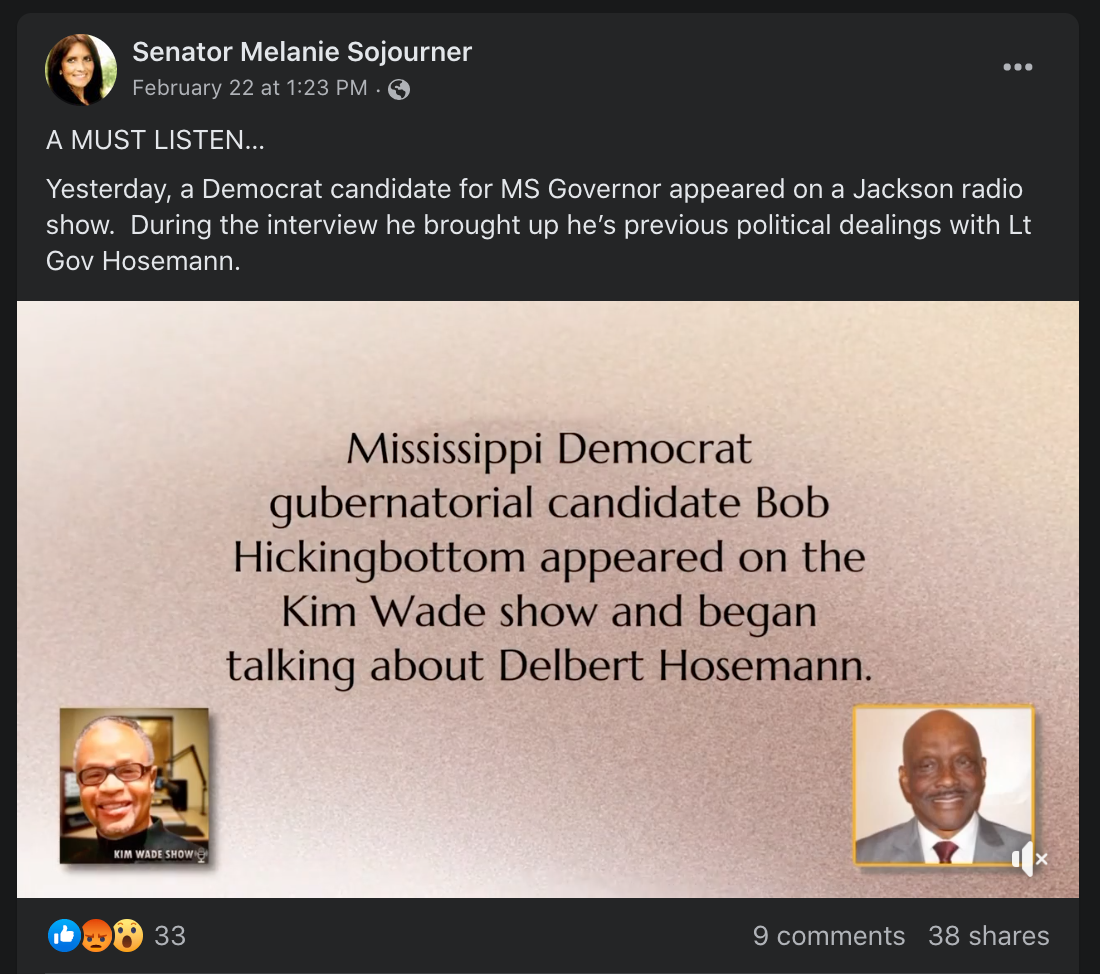
McDaniel posted the same radio clip to his own Facebook page with similar language to Sojourner’s post: “BREAKING: This is a MUST LISTEN. Democrat candidate for Governor discusses Delbert Hosemann: ‘He’s a Democrat.’”
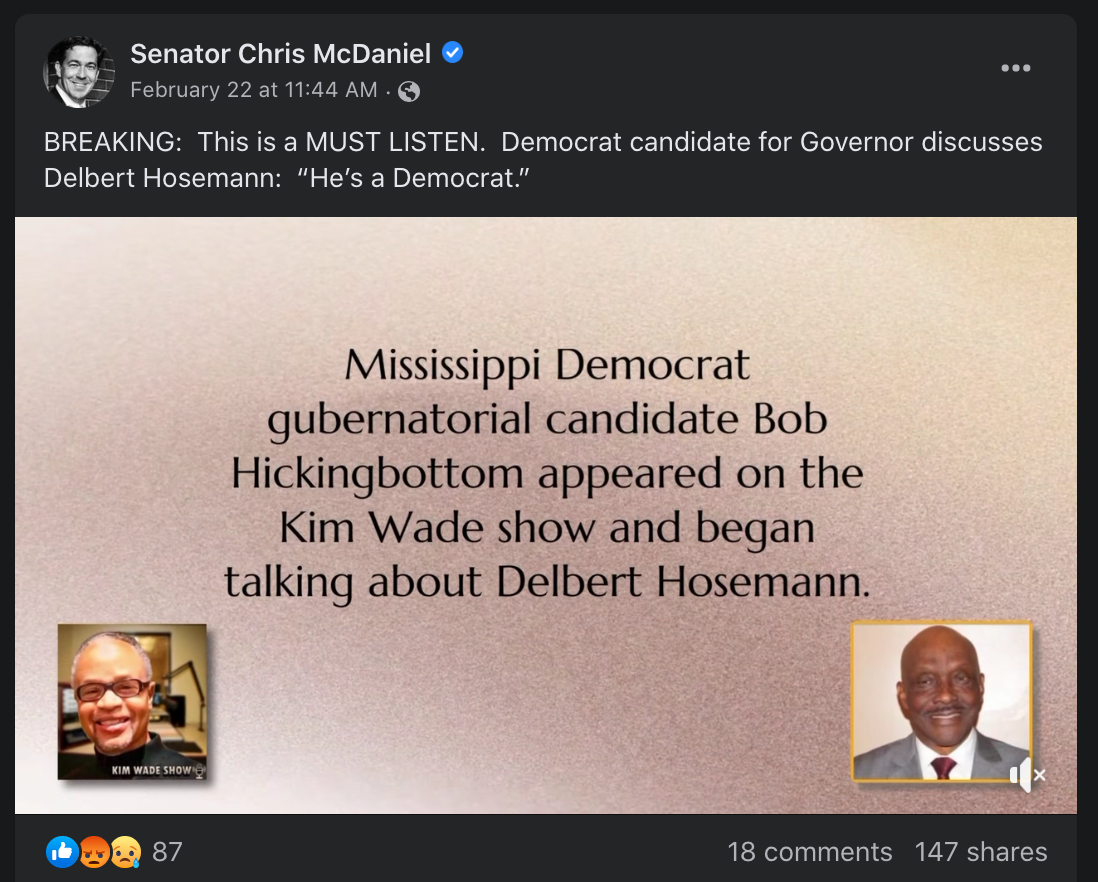
Others in right-wing media have been singing the same tune. Jim Cegielski, publisher of the Laurel Leader-Call newspaper and a longtime McDaniel lackey, wrote a column about Hickingbottom’s shock claim with the headline: “Delbert’s a Democrat … Bet your Hickingbottom dollar on it.”
McDaniel posted that column to his hundreds of thousands of social media followers multiple times. In all, McDaniel has posted at least 10 separate posts to his social media pages boosting Hickingbottom’s words and using them to paint Hosemann as a Democrat.
“BREAKING NEWS: Delbert Hosemann gets a huge endorsement this week,” McDaniel posted on Feb. 23. “You are not going to believe it! We’ve always known Democrats love Delbert Hosemann behind the scenes, but now they are becoming public in their support. A Democrat candidate for Governor, Bob Hickingbottom, publicly endorsed Delbert Hosemann this week!”
That long post from McDaniel went on to mention the Kim Wade radio interview, closing the post by writing: “Perhaps Bob Hickingbottom did say it best — Delbert is the best Lt. Governor that Democrats could possibly have in Mississippi. It’s time for a change, Mississippi.”
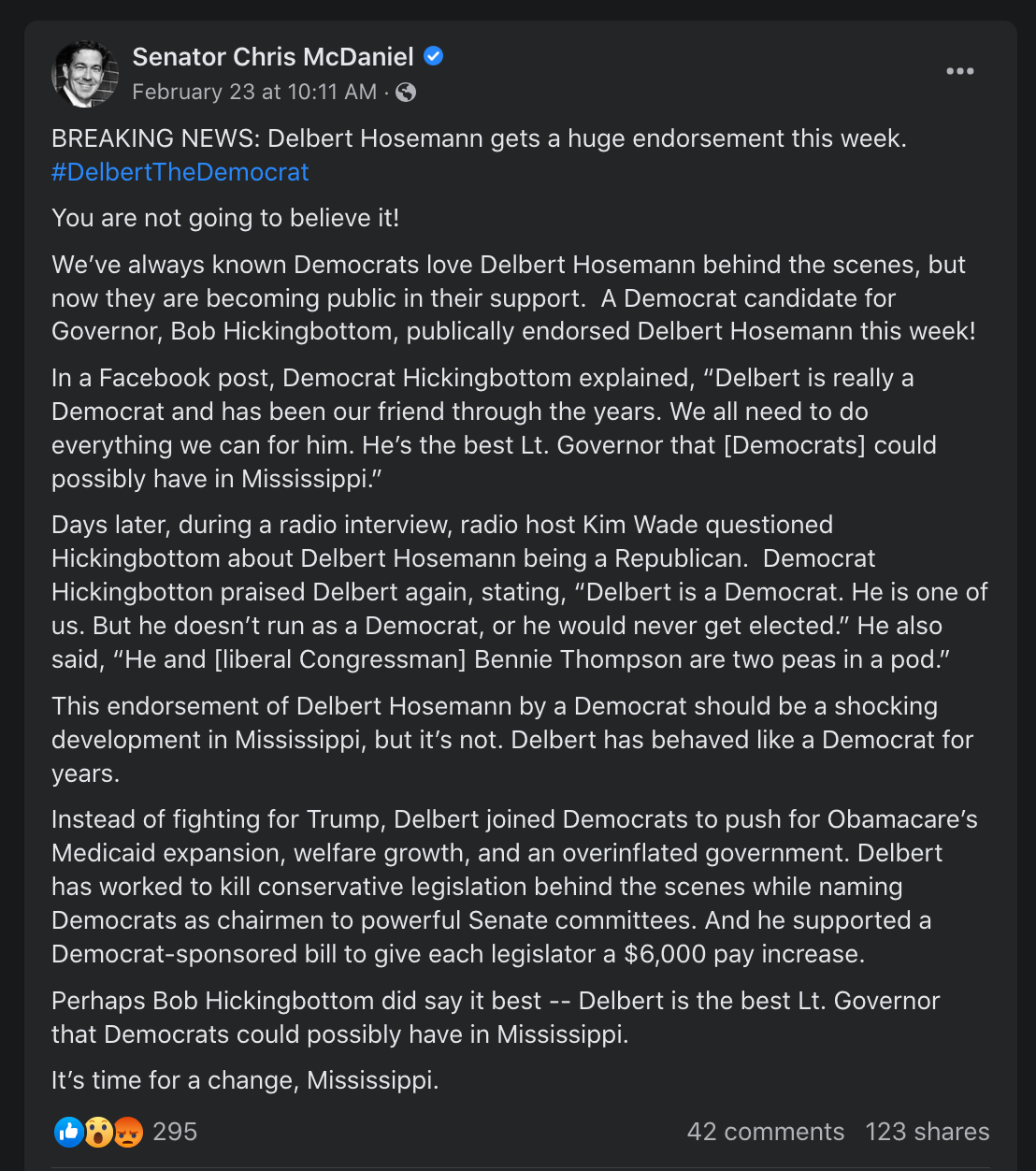
Hickingbottom, for his part, keeps on posting, even after Mississippi Today questioned him about his posts.
On March 7, Hickingbottom posted a letter he says he sent to Hosemann.
“To my fellow Mississippian and friend Lt. Governor Delbert Hosemann,” Hickingbottom’s letter begins, “I have been told that I may have hurt you and your re-election campaign for Lt. Governor. I sincerely hope that is not true because that was not my intention. If you recall, I first met you many years ago when I was introduced to you by our mutual friend Louis Armstrong. In those days we were all proud Democrats like most of Mississippi at the time.”
On March 9, Hickingbottom posted a rambling, all-caps post that reiterates he never meant to hurt “Lt. Gov. Delbert Horseman (sic).”
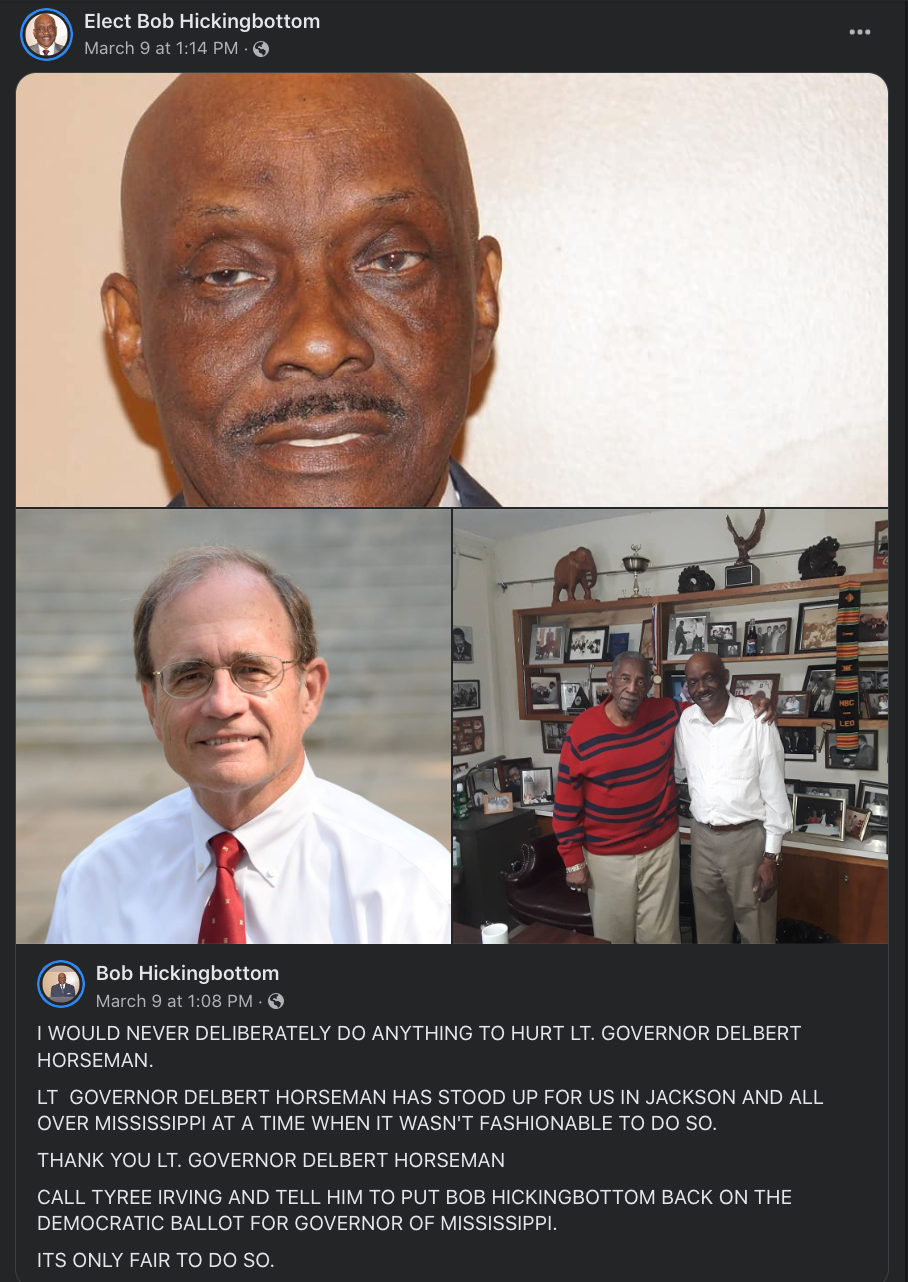
On March 12, Hickingbottom posted a criticism of Hosemann for his work to change the Mississippi state flag in 2020, retiring the state’s last-in-American Confederate battle emblem design to a museum. That is a pirated talking point from many of McDaniel’s supporters.
Asked for comment, the Hosemann campaign appeared to be following the sequence of Hickingbottom events closely.
“This scheme was concocted to create a false narrative to support a losing campaign,” said Casey Phillips, senior adviser for the Delbert Hosemann campaign. “Why else would a former Klansman and known McDaniel supporter be running this person’s Facebook page? Before we know it, they will all be locked up in a courthouse again.”
Phillips said Hosemann does not Hickingbottom, and that Hosemann has never received any letter from Hickingbottom — including that strange March 7 letter posted to Facebook.
The courthouse reference, of course, harkens back to the 2014 U.S. Senate race, when a McDaniel campaign staffer and two McDaniel supporters were found locked in the Hinds County Courthouse late on election night — one of just many shocking wrinkles of that wild race.
McDaniel’s campaign denied working with or communicating with Hickingbottom’s campaign and said that Murray is not working for the campaign.
“Unequivocally, neither Senator McDaniel nor any member of his campaign apparatus are communicating with, coordinating alongside, nor focusing on Bob Hickingbottom’s candidacy,” said Nicole Tardif, spokesperson for McDaniel’s campaign.
Murray, who told Mississippi Today last week he was not working with McDaniel, apparently fashions himself as working behind the scenes for the conservative state senator.
With the past week, Murray sent text messages to several people across the state. One person, granted anonymity over fear of retribution from the Ku Klux Klan, shared the Murray text with Mississippi Today. The message’s focus: “Delbert the Democrat.”
This article first appeared on Mississippi Today and is republished here under a Creative Commons license.
Mississippi Today
Mississippi school superintendents indicted on fraud charges
The superintendents for Leake County and Hollandale school districts and a consultant have been indicted on four federal counts of conspiracy to commit embezzlement, theft and bribery.
According to the indictment, Earl Joe Nelson, while superintendent of Clarksdale Municipal School District and now Leake County School District, and Mario D. Willis, as superintendent of Hollandale School District, allegedly paid each other tens of thousands of dollars in school funds for consultant services that were never rendered from November 2021 until at least June 2023.
Additionally, the duo is accused of stealing U.S. Department of Education funds that were intended for their respective districts.
A St. Louis-based consultant and teacher, Moneka M. Smith-Taylor, has also been indicted on bribery charges in connection with the case. She allegedly received more than $250,000 from Willis for consulting services that were never provided over the course of two years.
She returned part of that money to Willis in the form of a cash kickback in return for the consulting contract, the indictment says.
A spokesperson for the Mississippi State Department of Education directed Mississippi Today to local school boards, who make personnel decisions for their respective districts, for comment.
The job status of the two superintendents is unclear. District officials could not be reached by presstime, but Willis is still listed as the superintendent of Hollandale School District and Nelson is still listed as the superintendent of Leake County School District in the state education department’s online directory.
It’s also unclear whether the defendants have a lawyer who could speak on their behalf.
This article first appeared on Mississippi Today and is republished here under a Creative Commons Attribution-NoDerivatives 4.0 International License.
The post Mississippi school superintendents indicted on fraud charges appeared first on mississippitoday.org
Note: The following A.I. based commentary is not part of the original article, reproduced above, but is offered in the hopes that it will promote greater media literacy and critical thinking, by making any potential bias more visible to the reader –Staff Editor.
Political Bias Rating: Centrist
The article reports on the indictment of two Mississippi school superintendents and a consultant on federal fraud charges in a straightforward, factual manner. It presents the legal allegations without editorializing or taking a stance. The language is neutral and focused on relaying verified information from the indictment and official sources, without suggesting guilt or innocence. There is no evident ideological framing or advocacy; rather, the piece sticks to reporting the details of the case and the status of the individuals involved. Thus, the article adheres to objective journalistic standards without discernible political bias.
Mississippi Today
Defendant in auditor’s ‘second largest’ embezzlement case in history goes free
Four years ago, agents from the state auditor’s office arrested Tunica nonprofit operator Mardis Jones in what the office trumpeted as the second-largest embezzlement case in its history and demanded Jones return over $1 million to the state.
The charges accused Jones of stealing $750,000 from a home rehabilitation program he was supposed to be administering while turning away needy rural residents living in crumbling houses.
But his defense attorney attacked holes in the case, and last month, a local jury found Jones not guilty of the criminal charges. Now, the state has made no indication it will bring a civil case to try to claw back the money from him.
Jones’ nonprofit Tunica County Housing Inc. secured a subcontract with the county through the North Delta Regional Housing Authority in 2014 to run the county’s home rehabilitation program funded with casino revenue. For his work, vetting applications and managing expenses, Jones earned $12,000 a month.
At the core of the criminal case were “strange money transfers” and a finding that several of the people whose applications for home rehab were approved allegedly never received any repairs to their homes. According to the auditor’s office, investigators found less than 20% of the nearly $2 million Jones’ nonprofit received went to the contractors working to rehab homes.
“Once again, an arm of government trusted a private organization to run a government program, and a large percentage of the program’s spending was flat out stolen,” State Auditor Shad White said in a press release after the arrest.
Attorney General Lynn Fitch echoed White, saying, “These funds – hundreds of thousands of dollars – were meant to help the elderly, handicapped, and poverty stricken. But the funds never got to the vulnerable citizens who needed it most.”
Jones’ lawyer Carlos Tanner explained to Mississippi Today that the program operated with an extreme backlog, and that “some of the people they were claiming didn’t get their houses done actually did” by the time the trial was held this year.
The program was poorly administered, Tanner said, meaning that even if a person’s application was approved and a rehab contract prepared, county officials could direct Jones to put someone else’s repair job ahead of his or hers.
“But just because it was run like a first weekend lemonade stand does not mean Mardis Jones stole money,” Tanner said.
Tanner said the investigators gathered paltry evidence, only looking at details that fit their narrative. While Jones did earn a large salary through his contract, Tanner said prosecutors never presented evidence that Jones converted money that was supposed to be used on home rehabilitation to his personal use.
Investigators got a warrant to seize Jones’ electronics, Tanner said, but “they never bothered to search it.”
“The two OSA (Office of the State Auditor) officials who were running the investigation, I questioned them about it during trial, and neither of them could tell me where the computer was, where the phone was, or what the contents were,” Tanner said.
Jacob Walters, a spokesperson for the auditor’s office, defended the way the investigators handled the case, saying, “The state auditor’s office is never going to turn a case we investigated over to a prosecutor unless we’re fully confident in the work that we did.”
At the time the auditor’s office announced the Jones arrest, it also said it delivered a demand letter ordering Jones to repay over $1 million, the money it alleged he stole plus interest and investigative expenses.
It’s up to the attorney general or local district attorney to decide how to prosecute auditor investigations, or in Jones’ case, what happens to the civil demand now that a jury found him not guilty in the criminal case.
When a person receives a demand alongside his or her arrest, regardless of what happens with criminal charges, the claw back can be enforced through civil litigation — much like the case against several defendants in a stunning Mississippi Department of Human Services fraud case, which began in 2020 and has yet to be resolved. Walters said the demand against Jones is still the office’s next-largest in history, second only to the welfare scandal.
The government might choose to pursue civil litigation, even if criminal prosecution is unsuccessful, because there is a lower burden of proof to win civil cases.
But the attorney general’s office told Mississippi Today last month that it had not received the Jones demand letter from the auditor, meaning it has nothing left to enforce.
Walters said the auditor’s office sent the letter along with the case file four years ago, but that with a turnover in attorneys prosecuting the case, the auditor had to resend the file last year. If the attorney general’s office no longer possesses the demand document, Walters said, “it’s an incredibly easy problem to resolve.”
“Just reach out to us with a single phone call or email and we can get it to you,” Walters said.
After the interview, the auditor’s office sent the demand letter by email, and the attorney general’s office confirmed it was received.
This article first appeared on Mississippi Today and is republished here under a Creative Commons Attribution-NoDerivatives 4.0 International License.
The post Defendant in auditor’s ‘second largest’ embezzlement case in history goes free appeared first on mississippitoday.org
Note: The following A.I. based commentary is not part of the original article, reproduced above, but is offered in the hopes that it will promote greater media literacy and critical thinking, by making any potential bias more visible to the reader –Staff Editor.
Political Bias Rating: Centrist
This article presents a factual and balanced account of the embezzlement case involving Mardis Jones without overt ideological framing. It reports statements from both government officials criticizing the alleged misconduct and the defense attorney’s rebuttals, highlighting weaknesses in the prosecution’s case. The tone remains neutral, avoiding partisan language or loaded terms. It focuses on the procedural aspects, jury verdict, and potential civil actions without advocating for a political viewpoint. The article provides context from multiple perspectives, adhering to objective reporting rather than promoting a specific ideological stance.
Mississippi Today
JPD called ICE on Miss. father, who faces deportation
Kerlin Moreno-Orellana is facing deportation over a misdemeanor charge that usually results in a fine. He was picked up by Immigration and Custom Enforcement agents on Thursday morning and transferred from the Raymond Detention Center to an ICE detention center in Louisiana.
On June 16, Jackson police arrested Moreno-Orellana, a contractor, in south Jackson along with his employer Christy Parker, who was showing him one of the old properties she worked on. Both were charged with illegal dumping, but Parker claims they did not dump anything.
After detaining them, Jackson police called a local TV outlet, 16 WAPT News, to come shoot the scene of the arrest. Parker said they were kept in the police car for over an hour, waiting for the news crew. The WAPT newsroom explained that the Jackson police routinely asks them to cover arrests related to illegal dumping or other high profile cases, in order to “dissuade people.”
Once at the station, the Jackson Police Department called ICE on the 35-year-old father of four, who had worker authorization documents. He was kept in jail overnight, while Parker was released hours after their arrest.
“He didn’t do anything I didn’t do,” Parker said in an interview with Mississippi Today. “But because I’m white, I’m here?”
A municipal court ordered Moreno-Orellana’s release the day after, but ICE placed a detainer on him – a formal request to keep a non-citizen in custody for 48 hours, while the agency investigates. It is not an arrest warrant. However, a state law passed in 2016 mandates that all local law enforcement comply with ICE detainers placed on undocumented immigrants.
“What we are doing today is no different than what we’ve always operated when the detainer is sent by ICE to the jail,” said Hinds County Sheriff Tyree Jones. “Nothing has changed.”
While the Hinds County Sheriff’s Department has historically worked with ICE, Jackson police actively seeking out ICE to detain people is a fairly recent occurrence, said Mississippi-based immigration attorney Jeremy Litton. Jackson police did not respond to a request for comment.
ICE picked up Moreno-Orellana with hours left on his detainer, and he now faces deportation. ICE spokesperson Lindsay Williams said that Moreno-Orellana violated the conditions of a past bond agreement by being arrested for a new charge. He had already spent over a month in ICE custody in 2019, after getting arrested by park rangers for speeding and driving without a license.
Still, a minor misdemeanor charge – like illegal dumping – is normally insufficient for ICE to threaten to deport someone with worker authorization paperwork. Removal of a person with documentation is usually justified if the person is deemed a threat to public safety or national security.
“This does feel like a result of the elevated focus on deporting people from the Trump administration,” said Matt Steffey, professor at the Mississippi College School of Law.
Moreno-Orellana, who is from Honduras, has three boys and a girl, the youngest of whom is less than a year old. He has lived in Mississippi for over 16 years. Colleagues describe him as a valuable worker and a good friend.
“All he ever did was work and go home,” Parker said. “He was always willing to give somebody help.”
The possibility of his deportation is leaving his family in a precarious situation. Moreno-Orellana was the sole breadwinner of the family, and his wife worries about sustaining herself and their children without him.
“I’ve always dedicated myself to taking care of my kids at home, and he’s the one who brings food to the table,” his wife said in Spanish. “I’m afraid of staying, being without my children’s father. Not so much for me, but because they need him.”
This article first appeared on Mississippi Today and is republished here under a Creative Commons Attribution-NoDerivatives 4.0 International License.
The post JPD called ICE on Miss. father, who faces deportation appeared first on mississippitoday.org
Note: The following A.I. based commentary is not part of the original article, reproduced above, but is offered in the hopes that it will promote greater media literacy and critical thinking, by making any potential bias more visible to the reader –Staff Editor.
Political Bias Rating: Center-Left
This article primarily reports on the actions of law enforcement and ICE with a focus on the human impact of deportation on a Mississippi family. While the reporting remains factual, the framing and choice of quotes highlight concerns about racial disparities, immigration enforcement policies, and potential overreach by authorities, suggesting a subtle critical tone toward current immigration enforcement practices. The article’s emphasis on the family’s hardship and the legal nuances involved positions it slightly left-of-center, sympathetic to immigrant rights and critical of aggressive ICE actions. However, it avoids overt ideological language, maintaining largely balanced coverage.
-
News from the South - Tennessee News Feed6 days ago
Thieves take thousands of dollars in equipment from Union County Soccer League
-
Mississippi Today4 days ago
Defendant in auditor’s ‘second largest’ embezzlement case in history goes free
-
News from the South - Texas News Feed6 days ago
Robert Nichols to retire from Texas Senate
-
News from the South - Louisiana News Feed6 days ago
3 lawsuits filed against CVS, Louisiana AG announces
-
News from the South - Missouri News Feed6 days ago
Residents provide feedback in Kearney Street Corridor redevelopment meeting
-
News from the South - Alabama News Feed6 days ago
News 5 NOW at 12:30pm | June 24, 2025
-
The Conversation6 days ago
The Vera C. Rubin Observatory will help astronomers investigate dark matter, continuing the legacy of its pioneering namesake
-
News from the South - Texas News Feed5 days ago
The Rio Grande Valley as Heart of LGBTQ+ Resistance and Joy
